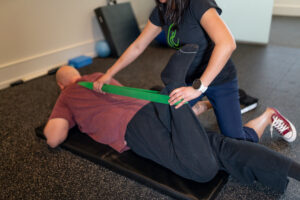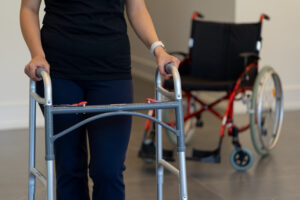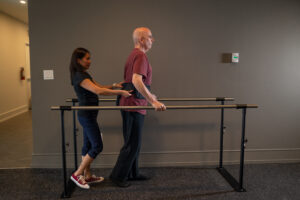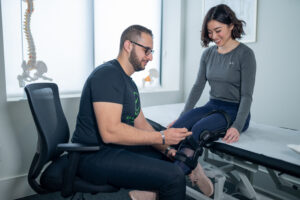
Getting hurt is a part of life, and it happens to everyone at different times. Getting better is a choice that is made and actively worked upon. Physiotherapy is a way to regain mobility and live life to the fullest in your body. It is important to recognize that the healing process takes time, both in the clinic and at home while doing the exercises provided by the practitioner. There are many benefits to physiotherapy, which leads us to this month’s blog post, focusing on the different ways to improve your life with a physiotherapist.

Figure 1. A patient displays the usage of resistance bands to help with strengthening exercises. Lindsay the Physiotherapist is there to guide them throughout the set.
Having the same routine every day allows you to notice subtle differences in the body, but over time, wear and tear or accidents can occur. When the body undergoes trauma, there is a direct impact on its functioning afterward. Every case is different, and the body can heal with proper care. Figure 1 displays one of the exercises practiced during a session. Losing mobility, flexibility, and overall function of the body can be stressful and have lasting effects, impacting the way you live your life. Whether it’s due to breaking a bone, having surgery, falling, or even preparing for the next big hike, physiotherapists are here to help.
Usually, after someone breaks a bone or undergoes surgery, they receive a referral to start physiotherapy within a specific time frame. Additionally, they receive written advice on when to bear weight and when to engage in non-weight-bearing exercises, along with guidance on duration. As seen in Figure 2, proper care after a significant break can lead to improvements. Progression after surgery or a fracture can range from limited mobility in a wheelchair to using a walker, and eventually achieving full independence. Providing the physiotherapist with these recommendations allows the treatment to focus on optimal healing for your body and condition. The more medical documents provided to the physiotherapist, the better, including referrals, X-rays, CT scans, MRIs, or any other relevant information. The healing process is crucial as the body does not function normally after a break or surgery. Once a treatment plan is provided and exercises are prescribed, it’s essential to practice these movements daily or every other day for the best results.

Figure 2. The transition from being in a wheelchair to using a walker is a big step that can be accomplished with work after a surgery. Breaking a bone or surgery can limit your ability to walk, however with proper care and treatment bones can heal and walking can be possible again.
Every physiotherapist and clinic has unique approaches to patient care and treatment. At Health Bound Health Network, we are CARF-certified. CARF, an independent nonprofit accreditor of health and human services, ensures that we provide the highest quality care to our patients, enabling them to leave stronger than when they arrived. Listening to our patients is paramount to us, as it allows us to help them return to normal life through tailored exercises. We strive for our patients to reap all possible benefits while under our care. There are numerous reasons to seek a physical therapist, and it’s essential to discuss any concerns with your doctor for potential recommendations. The reasons for visiting our clinic vary for each individual. Physiotherapy offers significant benefits through proper strengthening techniques. After working with a physiotherapist, patients often experience improved mobility, coordination, and muscle strength.

Figure 3. Walking over time can be difficult with age. It is important to work on posture in order to help the backs ability to function effectively. Lindsay is shown here guiding the patient as they walk, providing any advice needed in order to continue this trend outside the clinic.
Studies have shown that when people get injured and receive assistance from a physical therapist, there are long-term benefits. The physical therapist conducts a thorough analysis of your body to identify areas of pain or strain, enabling the creation of a personalized routine to improve your mobility. Pain relief often occurs through home exercises and attending treatment regularly. Initially, pain may be more pronounced during the first few sessions, but over time, you’ll build strength and reduce inflammation. The resulting pain relief can lead to increased mobility and flexibility in problem areas. By focusing on strengthening exercises, your body becomes stronger and more flexible, enhancing overall physical function, balance, and coordination. At Health Bound Health Network, our physiotherapists aim to guide you towards your body’s optimal physical state without pain or stiffness. Visiting the clinic can greatly improve your quality of life by addressing issues arising from repetitive movements, accidents, lifestyle factors, or sports-related injuries. Figure 3 illustrates proper walking form and posture, offering tips to enhance walking function in daily life. The reasons for seeking a physiotherapist are diverse, reflecting the fact that we use our bodies daily for various activities, and issues can arise anywhere. Physiotherapy can be beneficial at any stage of life, although if you’ve never visited a physiotherapist before, you may not fully understand the benefits it can offer your body.
The first step after an injury or experiencing chronic pain is to seek medical attention from your physician to determine the recommended treatment. In cases involving surgery or fractures, the doctor may provide a referral for physiotherapy and may also prescribe assisted devices like a boot or brace, as illustrated in Figure 4, to support bone healing. While a referral is not required to book an appointment with us, providing detailed information about your condition can help ensure the best quality of care for your recovery. Any medical documents you possess, including notes on your body’s abilities or pain levels, are valuable for the physiotherapist. During the initial treatment session, an assessment will be conducted, with 45 minutes allotted for the appointment. The first 15 minutes will focus on discussing your pain and the injury’s cause, while the remaining 30 minutes will be dedicated to treatment and home exercises. To ensure a timely start to the session, please arrive 15 minutes early to complete necessary paperwork, including your past medical history and consent forms. We can provide the paperwork via email upon request. If you have access to a printer, you’re welcome to print and complete the forms at home before your appointment. Health insurance may cover the costs of physiotherapy, so it’s advisable to check your benefits package beforehand. Each patient receives a personalized treatment plan tailored to their specific situation and the body part being addressed.

Figure 4. Assisted devices usually are given when someone has surgery or a break. As seen in the image above, a brace is being used to help guide the healing process. Referrals that are given sometimes provide advice for you to do physio and bear weights or not. Having a referral is not required for treatment but does assist in the treatment plan.
Our physiotherapists specialize in enhancing mobility and flexibility throughout the body. Recovering from injuries or chronic pain can improve coordination, reducing the risk of falls and further injury. Addressing one area of the body can positively impact overall function, as the body is interconnected, and consistent use of proper strengthening exercises can enhance full-body function. Aging naturally brings changes to the body, and discussing these changes with a physiotherapist can help manage pain before it becomes a long-term issue affecting quality of life. Consistently following the treatment plan and doing prescribed exercises at home can improve lifestyle by maintaining strength. Additionally, there are mental benefits to improved physical function, as achieving desired movement patterns can lead to mood improvements. Witnessing the results of consistent exercise can be fulfilling, motivating individuals to continue their efforts.
Getting better always starts with you. Our team of professionals is dedicated to helping you regain your strength and mobility. We are committed to supporting you throughout your recovery journey and providing the assistance you need. Health Bound Health Network is here to extend our services to anyone in need of a physiotherapist. With five main locations in Toronto, Etobicoke, Markham, Barrie, and Hamilton, we are conveniently situated to assist you. Please don’t hesitate to contact us by phone or email with any questions about our services or to book your next appointment. You can reach us at 416-548-7872 or via email at [email protected]. We eagerly await the opportunity to assist you on your path to wellness!
Written By: Maria Votsis
References:
Physical Therapy: Benefits and How It Can Help | U.S. News (usnews.com)
Physical therapy: Who can benefit, and how can it help? (medicalnewstoday.com)
Physiotherapy For The Seniors | CBI Health
Physical therapy – InformedHealth.org – NCBI Bookshelf (nih.gov)
The Science Behind Physiotherapy: How it Works and Why It’s Effective (vitalphysio.ca)
What Are the Benefits of Physical Therapy? (healthline.com)
8 Common Types of Physical Therapy (healthline.com)
Photo:

